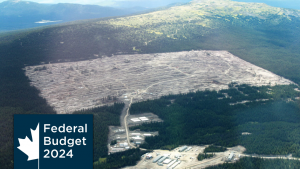Key federal construction stakeholders are saying “so far, so good” in reviewing the latest proposals of the federal government towards implementation of its National Infrastructure Assessment program.
On July 29 federal Infrastructure Minister Catherine McKenna released a document titled Building Pathways to 2050: Moving Forward on the National Infrastructure Assessment. The report summarizes comments received from over 300 stakeholders and proposes the establishment of an independent, non-partisan body to take the necessary steps to meet national infrastructure goals towards 2050.
The advisory body’s mandate will include carrying out the National Infrastructure Assessment; consulting broadly with all key stakeholders, including Indigenous communities; providing expert advice; and making recommendations to government.
Speaking prior to the anticipated federal election call, Association of Consulting Engineering Companies – Canada (ACEC) president and CEO John Gamble noted that the report supported the ACEC’s recommendation for an independent body. He said it’s noteworthy that support for the basic principles contained in the report is widespread.
“There seems to be some very broadly based support for the general direction of the national infrastructure assessment,” said Gamble. “And there seems to be a lot of consistency in terms of some of the recommendations received. Most noteworthy is probably the fact that there needs to be some level of independence to the National Infrastructure Assessment, which is something we certainly stressed heavily.
“I think there’s general acceptance that policy-makers, whether it’s designing the programs or funding the program, will make better and more informed decisions if people have confidence in the validity and the objectivity of the information captured in the assessment.”
Canadian Construction Association (CCA) president Mary Van Buren said the response of the federal government represented a significant achievement for the CCA and the construction sector. The CCA has long advocated for a long-term infrastructure investment plan, she said.
“The benefits are, of course, allowing for managing and building capacity,” said Van Buren. “This is particularly acute right now where we see this labour shortage, and having this longer-term plan will allow us to move forward more effectively and efficiently and to attract that labour that we need.
“So we think this is great.”
The government announced its intention to conduct a National Infrastructure Assessment in December 2020, with McKenna pointing to the successful British program as a model Canada could learn from.
The consultation phase was launched in March with stakeholders invited to respond to federal principles presented in a document titled Building the Canada We Want in 2050.
The statement released by McKenna’s department July 29 noted the submissions were clear.
“There is strong support for an independent advisory body to lead an evidence-based process to identify Canada’s infrastructure needs over the near, medium and long term in order to achieve critical economic, social and environmental outcomes,” reads the statement. “This initiative should leverage global best practices and domestic expertise; identify Canada’s infrastructure needs and deficit; and develop a strategic roadmap for infrastructure investments that meet our needs and drive us to net-zero emissions.”
Another recommendation that will “inform the assessment’s next steps” is to continue to leverage the Canada Infrastructure Bank to accelerate infrastructure development and extend the government funding envelope by encouraging private sector financing.
The ACEC is a contributor to the Canadian Infrastructure Report Cards which document infrastructure weaknesses and needs across the country and Gamble said that approach aligned well with the evidence-gathering role foreseen for a new national agency.
As for the independent agency’s role, Gamble noted there remains a duty for elected governments to make policy.
“People always talk about the need to depoliticize infrastructure,” he said. “But the fact is that the elected government should be responsible and accountable for the expenditure of taxpayer dollars, of the programs, that is their responsibility.
“But it’s certainly my belief that we’re going to get better decisions, and a longer-term vision, if everybody is working from objective, reliable information.”
Van Buren said Canada has learned it should be more in tune with global best practices and so that is a welcome direction from the government.
“That will help everybody,” she said. “Certainly, the whole risk-sharing between the owner and contractors has been a significant issue for us and for our members. And we are seeing more progressive partnerships being developed and that is something that the federal government has said it’s open to.”
Follow the author on Twitter @DonWall_DCN.











Recent Comments
comments for this post are closed